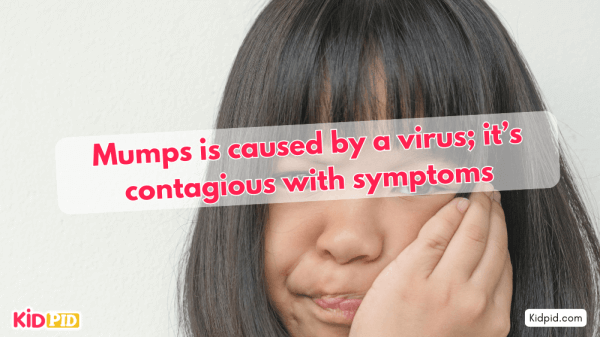Mumps is a sickness caused by a tiny germ called a virus. It’s important to learn about mumps because it can spread easily from one person to another. Let’s find out more about what mumps is, how it spreads, and what symptoms to watch for!
- What Causes Mumps: Mumps is caused by a virus, which is a type of germ.
- How It Spreads: Mumps is contagious, meaning it can easily spread from person to person.
- Common Symptoms: Swelling of the cheeks and jaw (this is the most noticeable symptom). Fever and headache. Sore throat and tiredness.
- Prevention: Getting vaccinated can help protect you from mumps. Washing hands and staying away from sick people can also help.
Mumps is a contagious viral infection with various symptoms.
Related MCQ’S
1. What causes mumps?
a) A bacteria
b) A virus known as paramyxovirus
c) A fungus
d) A type of allergy
2. What part of the body is mainly affected by the mumps virus?
a) Lungs
b) Salivary glands
c) Skin
d) Heart
3. How is mumps spread from one person to another?
a) By direct contact with skin
b) By coughing or sneezing droplets
c) Through eating contaminated food
d) By touching shared surfaces
4. What is a common symptom of mumps?
a) Swollen cheeks and jaw
b) Coughing with no fever
c) Rash on the skin
d) Difficulty breathing
5. Why is it important to get vaccinated against mumps?
a) To prevent a sore throat
b) To avoid neurological conditions and other complications
c) To reduce fever symptoms
d) To avoid headaches
6. What should you do if you notice symptoms of mumps?
a) Take a walk in the park
b) Visit the doctor and avoid public places
c) Ignore the symptoms and continue with normal activities
d) Drink lots of sugary drinks
You may like these:
Why do we sweat?
Sweating helps regulate body temperature by cooling the skin as water evaporates, preventing overheating, and maintaining homeostasis in response to physical activity or heat.
Why do I need vaccinations?
Vaccinations protect against diseases by stimulating the immune system to produce antibodies, ensuring the body is prepared to fight infections without experiencing illness.
Do You Know Science Behind Body Odor?
Body odor occurs when sweat interacts with bacteria on the skin, breaking down proteins and producing smelly compounds. Hormonal changes and diet influence odor strength.





